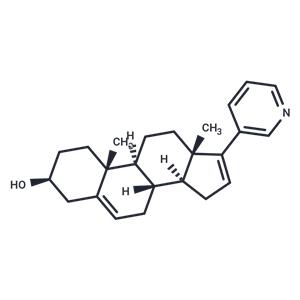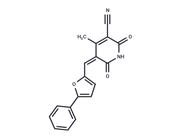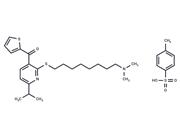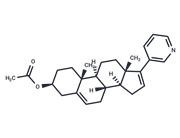| Name | Abiraterone |
| Description | Abiraterone (CB-7598) (CB-7598) is an effective steroidal cytochrome P450 17alpha-hydroxylase-17, 20-lyase (CYP17) inhibitor (IC50: 4 nM). |
| Cell Research | LNCaP and VCaP cells are seeded in 96-well plates and grown in CSS-supplemented phenol red-free or FBS-supplemented media for 7 days. Cells are treated with Abiraterone at 24 hours and 96 hours after plating and cell viability is determined on day 7 by adding CellTiter Glo and measuring luminescence.(Only for Reference) |
| Kinase Assay | C17,20-lyase activity assay: Microsomes are diluted to a final protein concentration of 50 μg/mL in the reaction mixture which contained 0.25 M sucrose, 20 mM Tris–HCl (pH 7.4), 10 mM G6P and 1.2 IU/mL G6PDH. After equilibration at 37 °C for 10 minutes, the reaction is initiated by addition of βNADP to obtain a final concentration of 0.6 mM. Prior to the distribution of 600 μL of the reaction mixture in each tube, Abiraterone is evaporated to dryness under a stream of nitrogen and then are incubated at 37 °C for 10 minutes. After incubation with Abiraterone, 500 μL of the reaction mixture is transferred to tubes containing 1 μM of the enzyme substrate, 17OHP. After a further 10 minutes incubation, tubes are placed on ice and the reaction is stopped by addition of 0.1 ml NaOH 1N. Tubes are deep-frozen and stored at ?20 °C until assayed for Δ4A levels. A Δ4A RIA is developed and automated on a microplate format using a specific antibody against Δ4A. The separation of free and bound antigen is achieved with a dextran-coated charcoal suspension. After centrifugation, aliquots of the clear supernatant are counted in duplicates in a 1450 MicrobetaPlus liquid scintillation counter. The Δ4A concentrations of unknown samples are determined from the standard curve. The detection limit is 0.5 ng/mL and the within and between assay coefficients of variation are 10.7 and 17.6%, respectively at an assay value of 13 ng/mL. The rate of enzymatic reaction is expressed as pmol of Δ4A formed per 10 minutes and per mg of protein. The value of maximum activity without inhibitor (control) is set at 100%. The IC50 values are calculated using non-linear analysis from the plot of enzyme activity (%) against log of inhibitor concentration. |
| In vitro | Abiraterone effectively reduces testosterone levels almost to the extent of testicular removal without significantly decreasing the size of any organ. It inhibits CYP17 in human testicular microsomes (IC50: 72 nM), leading to a reduction in testosterone levels by over 95% compared to the control group. |
| In vivo | Abiraterone inhibits the proliferation in vitro and the androgen receptor-mediated gene expression in androgen receptor-positive prostate cancer cells, likely through the suppression of steroidogenesis and anti-androgen receptor activity. At higher concentrations, Abiraterone inhibits the activation of mutant androgen receptors by enzalutamide. Abiraterone effectively replaces the ligand in WT-AR (EC50: 13.4 μM) and T877A mutant receptors (EC50: 7.9 μM). Additionally, Abiraterone acetate significantly suppresses testosterone secretion by 48% and increases LH levels to 192%. Abiraterone also inhibits the lysosomal activity in rat testicular microsomes (IC50: 5.8 nM). |
| Storage | Powder: -20°C for 3 years | In solvent: -80°C for 1 year | Shipping with blue ice. |
| Solubility Information | Ethanol : 5.4 mg/mL (15.45 mM), Sonication is recommended.
DMF : 8.75 mg/mL (25.04 mM), Sonication and heating are recommended.
DMSO : 1 mg/mL, Sonication is recommended.
|
| Keywords | Inhibitor | Cytochrome P450 | CB 7598 | inhibit | CYPs | CB7598 | Abiraterone |
| Inhibitors Related | Naringin | Naringenin |
| Related Compound Libraries | Bioactive Compound Library | EMA Approved Drug Library | Drug Repurposing Compound Library | Bioactive Compounds Library Max | Anti-Cancer Drug Library | Anti-Cancer Active Compound Library |

 United States
United States



